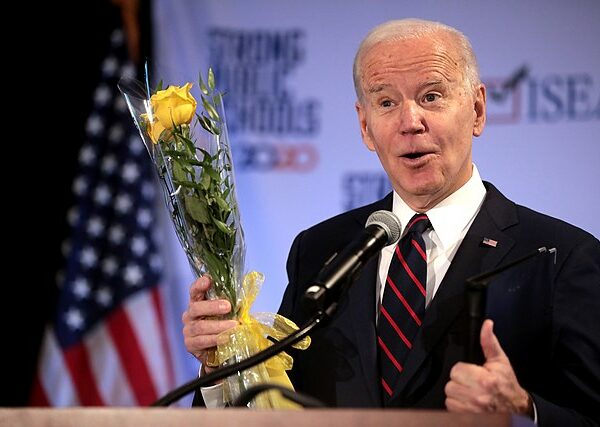
A forthcoming book by CNN’s Jake Tapper and Axios’ Alex Thompson delivers a damning indictment of the Biden 2024 campaign—not merely for its attempt to conceal the president’s physical and cognitive decline, but for the unmistakable signal it sent about the Democratic bench. Original Sin: President Biden’s Decline, its Coverup, and His Disastrous Choice to Run Again chronicles a campaign that operated less like a political operation and more like a crisis communications firm—obsessively managing optics, suppressing footage, and engineering theater, all while carefully avoiding the obvious question: Why not Kamala?
One of the book’s central episodes is a failed attempt to stage a friendly, pre-screened town hall in a Delaware high school gymnasium in April 2024. The scene was crafted to broadcast warmth and vitality: curated questions, controlled lighting, and a compliant audience. It fell apart in post-production. After 90 minutes of filming, not a second was considered usable, according to Axios. Some blamed the setting. Others were more candid. “The man could not speak,” one staffer admitted—dispensing with the now-familiar line that the president’s halting delivery could be chalked up to a stutter.
Thompson took to CNN to explain what happened, leaving a roundtable discussion stunned.
In the spring of 2024, the Biden Campaign flew the supposed leader of the free world to Delaware, filmed a staged town hall, but never aired it.
There are no heroes in the Biden White House, only crooks, cowards, and coverups. pic.twitter.com/l6Jw1ttLUM
— Charlie Kirk (@charliekirk11) May 21, 2025
This was not a one-off embarrassment. Tapper and Thompson draw from interviews with more than 200 Democratic insiders to portray a campaign increasingly reliant on editing tricks, short takes, and camera angles to paper over Biden’s growing difficulties. Basic deliverables—like recording a short greeting for a union or donor event—became ordeals. Five-minute asks became two-minute clips. Single-camera shoots became dual rigs for easier splicing. Still, even the most polished videos drew internal regret. They weren’t persuasive—they were transparent.
Avoiding unscripted encounters became a necessity. Town halls were scrapped in favor of closed sets. Organic moments gave way to manufactured ones. The message was clear: the White House couldn’t trust the president to perform in public. But the deeper truth, unstated yet unmistakable, is what they also weren’t willing to do—pass the baton. The campaign’s obsessive effort to keep Biden front and center was not born of confidence.
The authors also recently revealed that Hunter Biden was mostly in charge.
WATCH: CNN's Jake Tapper says Hunter Biden "was driving the decision-making for the family."
"He was almost like a chief of staff." 👀 pic.twitter.com/hZVP9ACt73
— Breaking911 (@Breaking911) May 20, 2025
While the coverup is bad, the need for the coverup might be even worse when you think about it. How terrible is Kamala Harris if the White House Democrats wouldn’t voluntarily pass her the torch?
The book leaves Harris’s exclusion largely unspoken, but the implications hang over every report that discussed the Biden years. If the president’s team recognized his unfitness yet refused to elevate his vice president, the conclusion writes itself: they feared she would fare worse. The Biden campaign may have hidden the president’s decline, but it laid bare a brutal assessment of the Democratic ticket’s depth.
Jill Biden, attempting to shield her husband from mounting criticism, told The View that skeptics “didn’t see how hard Joe worked every single day.” But Original Sin isn’t built on outsider conjecture—it’s built on insider confessions. The campaign, by its own admission, was in constant triage, struggling to reconcile a candidate unfit for the spotlight with the party’s refusal to name another.
In the end, the book appears to do more than chronicle a failed re-election bid in 2024. It offers a window into the dysfunction of a party unwilling to confront uncomfortable truths—about aging leadership, about the absence of succession planning, and most tellingly, about its own vice president.
For her part, Kamala Harris still believes she’s a viable candidate. A recent poll showed the former vice president held a commanding lead in the 2028 Democratic Primary field.
She led the early field for the 2028 Democratic nomination, backed by 36 percent of Democratic voters and Democratic-leaning independents, according to a new Morning Consult survey.
Trailing far behind is former Transportation Secretary Pete Buttigieg with 10 percent support—just days after announcing he won’t pursue a 2026 statewide bid in Michigan.
No other candidate reaches double digits. Thirteen percent of voters remain undecided.
A three-way tie for third place puts Minnesota Gov. Tim Walz, Harris’s 2024 running mate; Rep. Alexandria Ocasio-Cortez (D-N.Y.); and California Gov. Gavin Newsom at 5 percent apiece.
[Read More: Trump Appointee Finds Corruption In Arts Center]











